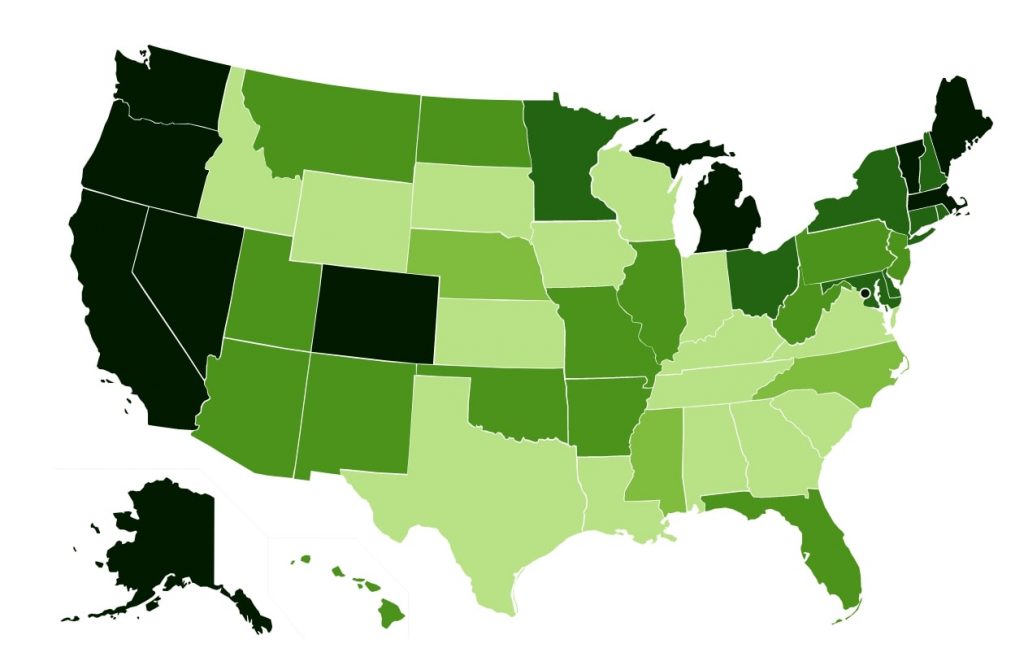4 Anti-Cannabis Myths Debunked
The map is getting greener. Last fall, cannabis ballot initiatives passed in Michigan, Missouri, and Utah.
But reform is not a given. In that same election, a recreational measure failed in North Dakota. Legalization also stalled out in Oklahoma, where a petition to get recreational cannabis on the ballot came up 20,000 signatures short.
This speaks to lingering prohibitionist pushback from a lobby that continues to propagate several anti-cannabis myths. But the best way to defeat old myths is with new data.
Here are several claims commonly made by opponents to legalized cannabis — rebutted with recent studies and evidence.

Getting there. Image courtesy of DISA.
States that legalize have higher crime rates
Last year, the editorial board of the Australian media outlet The Conversation analyzed crime statistics from America’s 30 “green” states that permitted medical cannabis. (There are 33 today).
Their resulting study, which is here, says that “Medical marijuana legislation does not contribute to crime, and possibly helps to reduce it.”
The largest body of data on this topic comes from California, where violent and property crime has decreased by 20% since 1996. This suggests that the availability of legal cannabis has undercut the black market and its associated violence. Additionally, decriminalizing cannabis has freed up police resources to thwart other crimes.
And in 2017, Snopes reviewed then-Attorney General Jeff Sessions’ assertion that the nation was seeing “real violence” in American communities as a result of cannabis use.
Their researchers analyzed a collection of recent studies and found that “Violent crime decreases in states with legal medical marijuana.”
Cannabis is a gateway drug
The Center for Disease Control’s official stance on this stubborn myth is that “more research is needed to understand if marijuana is a ‘gateway drug.’”
But their website also states that “the majority of people who use marijuana do not go on to use other, ‘harder’ substances.”
This runs counter to prohibitionists’ claim that individual cannabis users who also use hard drugs is proof of common causation.
As legalization unfolds we’re receiving new reports that cannabis is actually being used as an “exit drug”. A 2018 survey by Harm Reduction Journal of Canada (where medical cannabis has been legal since 2001) found that 59% of respondents who substituted cannabis for opioids eventually stopped using opioids entirely.
Another 45% of those surveyed stated that cannabis helped them dial back (or completely quit) drinking alcohol, and 30% said it helped them “exit” cigarettes.

Cannabis has helped thousands of people dealing with opioid dependency.
Legalization will create widespread cannabis use
This is the “think of the children” argument — if cannabis becomes culturally acceptable and more widely available, then underage students will experiment in greater numbers.
For this one, we turn to the ongoing legalization experiment in Colorado. A federal study published in 2018 revealed that the state “is not experiencing an increase in youth usage of marijuana.”
Another 2018 study, this one from the Colorado Department of Public Health and Environment, lends deeper insights: Cannabis use among the state’s middle and high-school students has decreased by a full percentage point since 2013, the year before dispensaries opened. And cannabis use among students age 13 and under has also decreased.
It’s not just Colorado. In 2016, the Center for Disease Control reported a 2% collective nationwide drop in teen cannabis use. (See the complete study here.)
In 2019, there is more thorough awareness of cannabis in the public space — and that can partially explain these downward trends.
Cannabis lowers your IQ, makes you lazy
This one is debunking itself in real-time as political leaders, CEOs, scientists, and accomplished artists of all stripes publicly own their cannabis use. The “lazy stoner” myth is on its way out.
But in the interest of bringing scientific research to an anecdote fight, we can point to a multi-institutional 2017 study performed by the National Academy of Sciences. It tracked the effects of cannabis on IQ scores in pairs of twins over a ten-year period.
The study’s authors wrote, “marijuana-using twins failed to show significantly greater IQ decline relative to their abstinent siblings.”
As more official data comes to us from our green states (and from our fellow consumers in Canada as well), it will further shape the debate ahead of future elections.
And these next few years may well be remembered as a watershed moment for the cannabis movement.
Related Articles
No Results Found
The page you requested could not be found. Try refining your search, or use the navigation above to locate the post.
